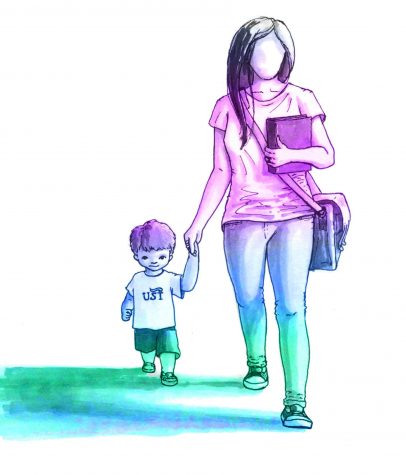Students lack accessibility to childcare, but push forward

When Mariah Wilhite became pregnant with her son Grayson during her freshman year, others told her to abort her child so she could finish her degree.
“They said I wouldn’t be able to graduate and finish school,” the junior social work major said. “They said I wouldn’t be able to live my life.”
Wilhite decided to keep her son and stay in school, only missing a week between giving birth and returning to classes her sophomore year.
“People will tell you that [becoming pregnant] will ruin your life,” she said. “But if you have the motivation, you can do it.”
Sometimes, Wilhite said she feels the university doesn’t support her as a parent.
“In the spring of 2016, my son got really sick and was admitted to the hospital for two to three days,” she said. “I missed class on Monday morning and let them know I wasn’t going to make it because we were in the hospital. My professor still tried to tell me I could not make up the exam.”
After that incident, Wilhite said she turned to the dean of students’ office and retook the exam with another professor.
“The professor said it was unprofessional of me to reschedule,” she said. “I don’t feel like everyone is friendly to parents here, like they don’t realize you have a life outside of textbooks.”
According to a 2017 report by the Institute for Women’s Policy Research, the number of student parents in the United States is growing.
The report states the number has grown from 3.7 million student parents in 2004 to 4.8 million in 2012. Nationally, 26 percent of the total undergraduate student population is made up of student parents.
The Institute for Women’s Policy Research report also states the availability of on-campus child care has been declining despite the growth in student parents.
Childcare hasn’t been accessible for Wilhite. In order to manage school, work and raising an 18-month-old son, Wilhite leaves Grayson with his grandmothers when she can’t watch him.
“Before I had my son, I was trying to utilize the child care facility here on campus, but it was almost impossible,” Wilhite said. “I sent an application and never got anything back.”
The university’s Children’s Learning Center serves children from the ages of 2-5 during the school year, as well as older children during the summer. The facility is open to any child in the community, but there is a preference for university-affiliated parents. There is also a wait list, as space in the Learning Center is limited.
Stephanie Murphy, a nontraditional student and parent to a 10-year-old son named Trenton, also felt the university’s child care could be altered to better support mothers like her.
Trenton falls outside of the range of ages allowed into the Children’s Learning Center during the school year. However, Murphy makes do by either bringing him to class and giving him something to stay occupied with, or dropping him off with the girls of her sorority.
“The childcare here is not really beneficial to everybody,” she said.
The senior Spanish and pre-med student said she also wishes the university had housing options for families, as Murphy moved with her son from upstate to go to school in Evansville.
“It stressed me out to figure out where we were going to live,” Murphy said. “I definitely don’t believe the university supports nontraditional students.”
Currently, Indiana State University and Purdue University both have family housing options, according to their websites.
Even though she can’t live on campus with her son or utilize the Children’s Learning Center, Murphy said she’s grateful to be able to bring her son to campus without feeling uncomfortable.
“My biggest thing is to make sure he doesn’t feel like he’s lost in the shuffle,” she said.
Ultimately, Murphy said she wants to set an example for her son. She hopes to work in either a hospital’s emergency room or NICU.
“I want [Trenton] to learn it’s never too late,” she said. “Life throws you curveballs you wouldn’t expect. Be flexible, and you can catch those curveballs.”Illustration by Philip Kuhns


